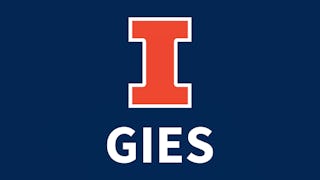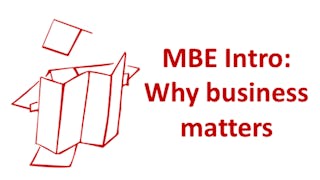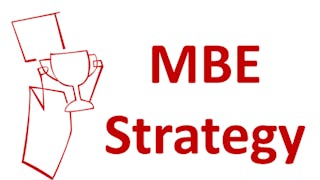Finance makes the world go around. It helps to raise money for new companies, allocate capital to projects, and provide loans to credit-worthy industries. Finance is also the glue that holds companies together - in charge of the annual budgeting and forecasting processes; when the FP&A department sends you an email, you should respond. Finance is way to assess projects by factoring in the estimates of future cash flows, the risks, timeframe, alternatives, and making smart decisions about money.

Early bird sale! Unlock 10,000+ courses from Google, Microsoft, and more for £160/year. Save now.


Mastering Business Essentials: Finance
This course is part of MBE Mastering Business Essentials Specialization

Instructor: John Kim
Included with 
Skills you'll gain
Details to know

Add to your LinkedIn profile
May 2025
2 assignments
See how employees at top companies are mastering in-demand skills

Build your subject-matter expertise
- Learn new concepts from industry experts
- Gain a foundational understanding of a subject or tool
- Develop job-relevant skills with hands-on projects
- Earn a shareable career certificate

There are 5 modules in this course
When someone says "I work in finance", that can mean many different things. It may mean they work in financial services - banking, insurance, payments, or investments. It may mean they work in a company in the Finance department: FP&A, Treasury, Corporate Finance, Accounting, Tax, Accounts payables etc. Find out the different "buckets" of finance.
What's included
4 videos2 readings
Corporate finance helps us make smart money decisions about raising capital, allocating capital, keeping liquidity. It's all based on the simple observation that there is opportunity cost with our time and money. Money today is worth money in 3 years because of a) opportunity cost b) inflation c) repayment risk. Some inflation is expected because it comes with economic growth, you don’t want too much. We need to "discount" future cash flows back to the present time; think of the future value of money like a bucket full of water, where the "discount rate" is a hole where the water leaks out.
What's included
5 videos1 assignment
Valuations = determining the worth of something. This is super important to companies (e.g., investment banking, technology startups) and also individual decision-makers (e.g., buying a house, comparing job offers). It's an art AND a science. It requires lots of assumptions, potential ranges of outcomes, and good excel modeling practices. Three big ways to triangulate a valuation range are a) discounted cash flows b) comparables analysis c) multiples analysis.
What's included
4 videos1 reading
Investments are a huge industry (think: mutual funds, ETF, investment advisors, sovereign wealth funds, venture capital, private equity, commercial banking, investment banking). It's also a competitive market where vendors are continually telling you how they can GET BETTER RETURNS. One key takeaway is "there is not free lunch." If you want better-than-average returns (e.g., alpha), then you need to aware of, and willing to deal with the risks too.
What's included
3 videos1 assignment
Personal finance is incredibly important because it directly affects your quality of living NOW (as you save, and don't spend) and quality of living LATER (retiring early, don't need an alarm clock). Generally, financial advisors strongly recommend that you invest steadily (dollar cost averaging), start investing early (get the power of compounding), and remain diversified across asset classes (don't put all your eggs in the same basket). If you can earn a lot, save a lot, invest consistently, and manage your spending expectations = you will retire early and enjoy it. Trust me.
What's included
5 videos1 peer review
Earn a career certificate
Add this credential to your LinkedIn profile, resume, or CV. Share it on social media and in your performance review.
Instructor

Offered by
Explore more from Finance

University of Illinois Urbana-Champaign
 Status: Free Trial
Status: Free TrialEmory University

Emory University
 Status: Free Trial
Status: Free TrialEmory University
Why people choose Coursera for their career





Open new doors with Coursera Plus
Unlimited access to 10,000+ world-class courses, hands-on projects, and job-ready certificate programs - all included in your subscription
Advance your career with an online degree
Earn a degree from world-class universities - 100% online
Join over 3,400 global companies that choose Coursera for Business
Upskill your employees to excel in the digital economy
Frequently asked questions
This targets 3 groups of people:
1) New college graduates: get smart quickly on business essentials quickly, prepare for interviews, start strong with new jobs
2) Corporate managers: develop a broader, more executive view of the business challenges, make better decisions; persuade with data, influence others (departments / leaders), get more done with same resources
3) Entrepreneurs: find a gap in the market for your product/service, acquire customers and drive word-of-mouth, drive business profits
Albert Einstein famously argued that simplicity is difficult. "If you can't explain it simply, you don't understand it well enough."
As adults, we need to learn selfishly and continually relate content to our lives and careers. These videos are short, but cover the the basics very well, which allows you to take a first-principles approach to learning. As Einstein said, "Education is what you remember, when you forget everything you learned."
Access to lectures and assignments depends on your type of enrollment. If you take a course in audit mode, you will be able to see most course materials for free. To access graded assignments and to earn a Certificate, you will need to purchase the Certificate experience, during or after your audit. If you don't see the audit option:
The course may not offer an audit option. You can try a Free Trial instead, or apply for Financial Aid.
The course may offer 'Full Course, No Certificate' instead. This option lets you see all course materials, submit required assessments, and get a final grade. This also means that you will not be able to purchase a Certificate experience.
More questions
Financial aid available,

